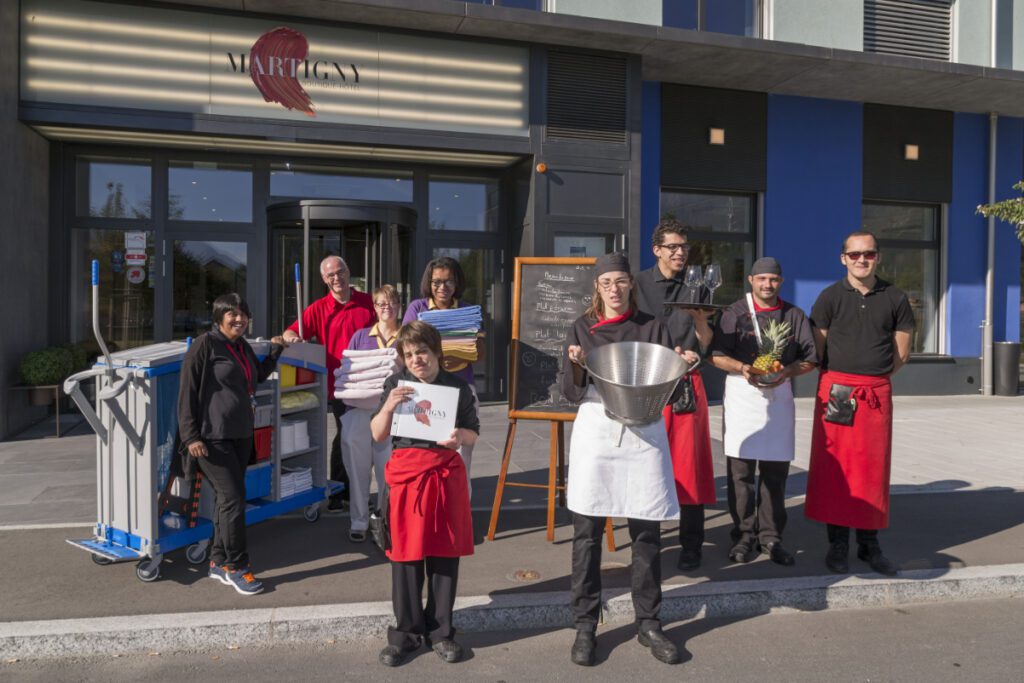Skift Take
Two out of three staff members at Martigny Boutique-Hotel in Switzerland are people with intellectual disabilities. We could all learn a lesson or two from the hotel's inclusive workplace and how the property maintains boutique standards.
Of the 70 team members at the Martigny Boutique-Hotel in the Valais region of Switzerland, 40 come from a foundation supporting people with intellectual disabilities.
“They have a lot of pride and their families do too, because they are placed in society,” said Mathias Munoz, director of Martigny Boutique Hotel. “They have coworkers and teammates. For everyone, it’s a really good thing to share life and work and to be integrated into society.”
Martigny’s model of a commercial-hotel-meets-social-inclusion project has been operating for almost eight years, but it remains a rare example in the industry. As more hotels try to boost their diversity, equity and inclusion efforts (that sometimes seem thin at best), the 52-room Martigny Boutique Hotel is making legitimate societal change.
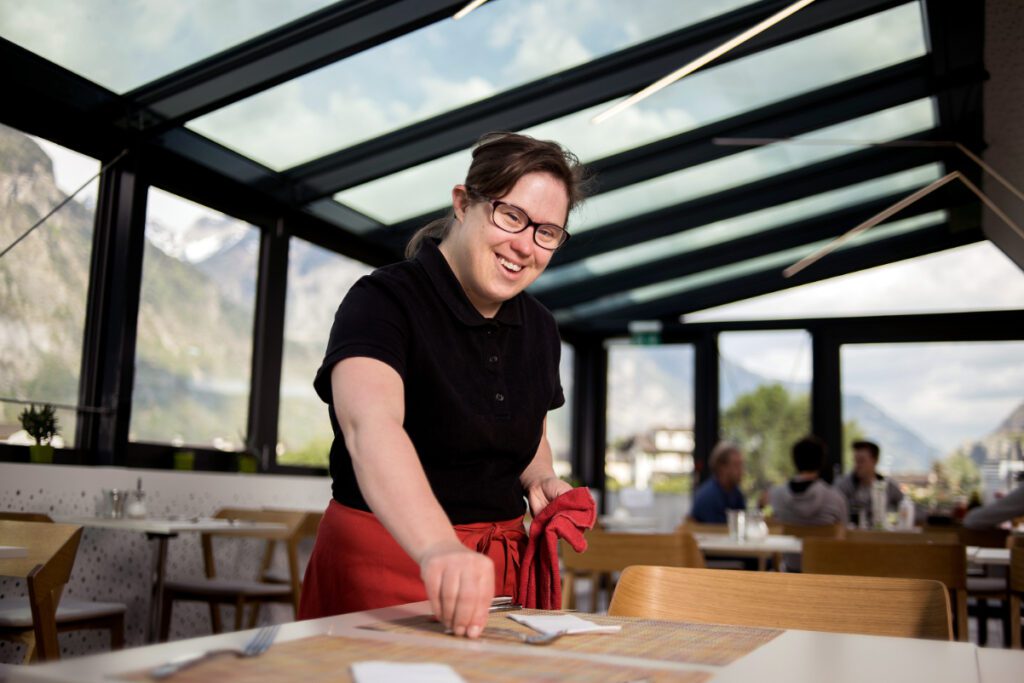
A few other hotels, like the nearly-year-old Shepherd Hotel in South Carolina (which Skift has also profiled), employ members with intellectual disabilities. So does the In Out Hostel in Portugal. Yet almost no other has the Swiss property’s rate of inclusion.
Yet while the Martigny hotel takes pride in its concept, it also wants to deliver as a “real” hotel. Its main goal is to deliver an art-themed experience with a solid restaurant and comfortable rooms.
“We want to be judged by our quality, and not just because intellectually disabled people work here,” said Munoz.
The hotel partnered with the Pierre Gianadda Foundation in Martigny — an art museum and cultural center — and each room is inspired by a famous artist and decked with posters from the cultural foundation.
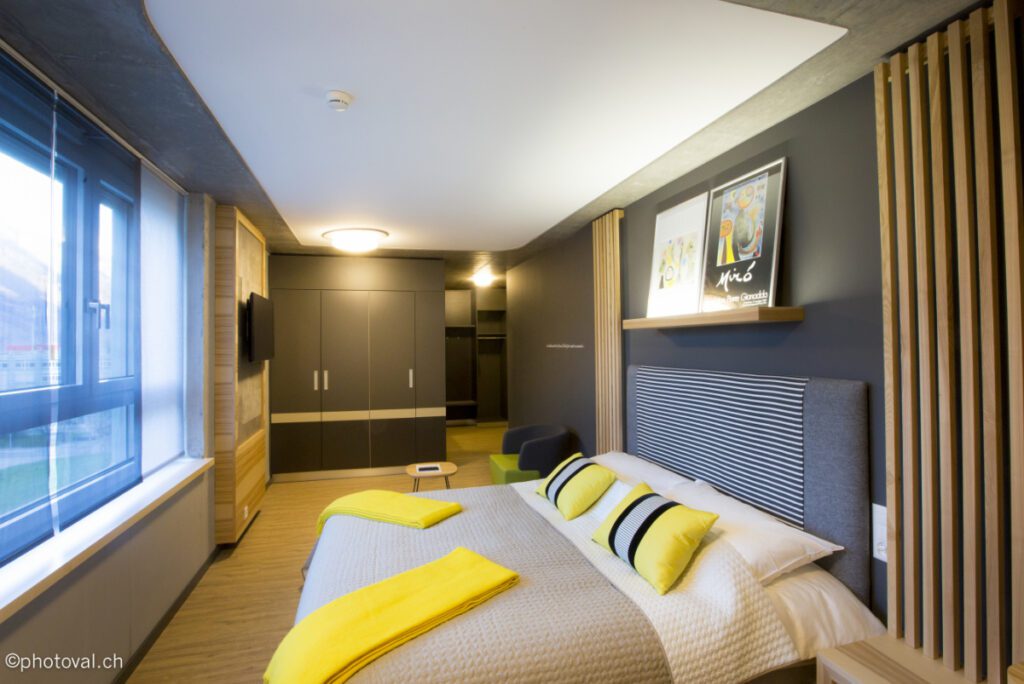
While the Martigny Boutique Hotel isn’t on the slopes like Verbier or under the iconic Matterhorn, it is in a convenient location for people passing through the area or on business trips. It’s a five-minute walk from the Martigny train station.
The Martigny Concept
What makes the Martigny Boutique Hotel concept work so well is that the hotel was started by the foundation FOVAHM (Fondation valaisanne en faveur des personnes avec une déficience intellectuell). It’s a private operation and doesn’t receive money from the government. For others to replicate the hotel’s formula, they would likely need to find a foundation devoted to the cause.
In the hallways, restaurant, and meeting rooms, you’ll also find artwork from FOVAHM workshops — made by people with intellectual disabilities. The hotel’s marketing team capitalizes its name as mARTigny to highlight its art connection.
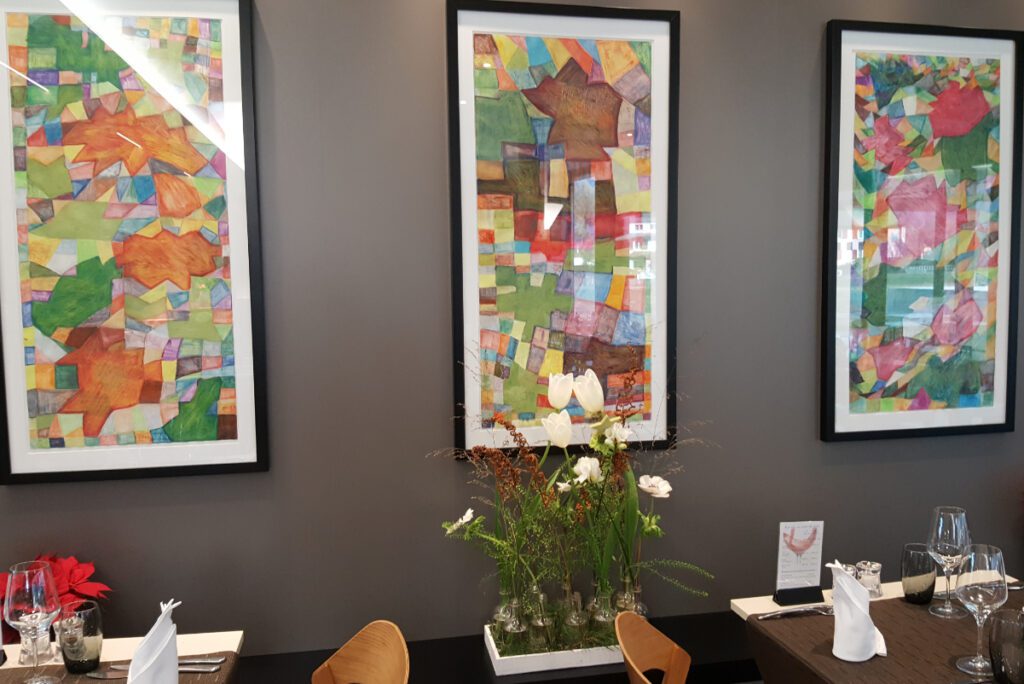
FOVAHM’s mission is woven into other aspects of the hotel, too. Everything from the croissants and jam you’ll eat to the shower gel in the rooms were produced in FOVAHM workshops in Valais that also employ people with intellectual disabilities.
This allows Martigny Boutique-Hotel to go one step further and not only employ team members with intellectual disabilities but also to use products made by other socially conscious partners. Its L’Atelier des Merveilles store sells FOVAHM workshop-produced goods, too.
Yet the hotel doesn’t scream from the rooftops about its connection to the FOVAHM foundation. It’s hard even to find mention of it on their website. However, they’ll tell first-time guests about the concept at check-in. And guests will likely notice on their own.
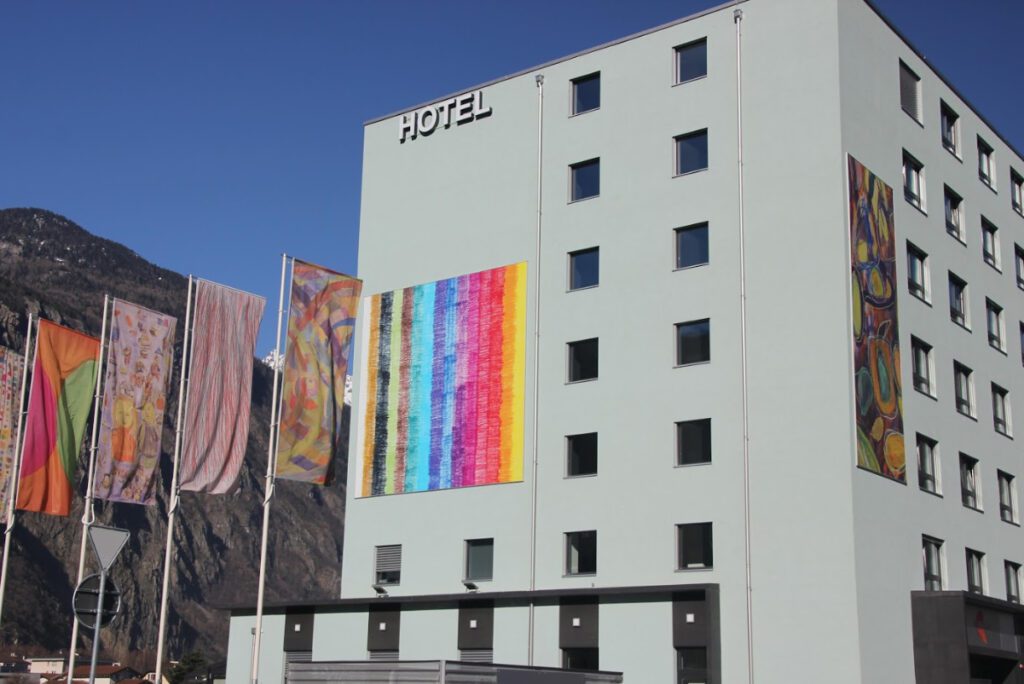
A Different Kind of Management
Munoz has a background in hospitality. He’s worked 20 years in the industry — most recently as the general manager for the Golden Tulip Hotels. But this is his first position with a social mission.
The role — which he’s had for almost seven years — isn’t without its challenges.
“I’ve had to learn to be patient and quiet,” said Munoz. “It’s a different type of management.”
FOVAHM teammates, for example, work at a different pace than other staff members.
Even though the role does come with extra tasks, such as communicating with the foundation and ensuring the model continues to operate smoothly, it’s more rewarding partly because the team members are less self-conscious about smiling or expressing their happiness, Munoz said.
“In this hotel, I’m happy because I can continue to do my job, but I have the feeling of being useful for something,” Munoz said.
“I think everybody can work, and everybody is able to work — at the right work,” said Munoz. “It’s a good thing for everyone. For the intellectually disabled team members, for customers, and for all of us.”
Additional Perspectives
We added the perspectives of Carl Shepherd, an investor who’s the co-founder of HomeAway (Vrbo), and who’s the father of a 25-year-old man with Down syndrome, and Douglas Quinby, co-founder of Arival, who has a 19-year-old son with Down syndrome.
Carl Shepherd: “I’m the father of a 25 year-old man with Down syndrome, who has worried since his birth about what happens after age 22. If there had been an operation like this — anywhere in the world — when Jack was born, I would have made it my mission to go, experience, and learn.
“There are two primary factors that limit opportunities for people with intellectual or developmental disabilities (IDD), and it would seem Martigny has solved for them. First, people with IDD need patient training and repetition. Second, some folks with IDD work slower than others, and therefore businesses need to accept this and design time schedules around that reality.
“People with intellectual disabilities represent the most underemployed cohort in the world. As Jack’s father, I am thankful for the work done by this foundation and by the team of typical managers who are committed to making this work. This hotel, and the Shepherd (no relation) hotel in Clemson, South Carolina, are leading the way simply by doing what others before them haven’t done: hiring people with IDD for jobs they can most certainly do.
“What these hotels create is what all of us want for our children: a community which values them, employs them, and includes them in the day-to-day world that all of us typical folks take for granted. For most people with IDD, this is out of reach.”
Douglas Quinby: “It’s always great to see coverage of initiatives like this — especially as a parent — and to see amazing opportunities for people with intellectual disabilities.“If I had any comment from the perspective of a parent (rather than an expert), it would be around how they handle guest communications and expectations around this. It has to be a central consideration for any business that wants to create opportunities with people with intellectual disabilities. For guests who don’t have much experience interacting with people with Down syndrome, autism or other disabilities, it can be confusing, and that could have negative impacts on guests — especially when they have paid with the expectation of a specific leisure hotel experience.
“There’s a big difference between a hotel hiring a few people with special needs in specific roles and with support in place so that they can be effective and deliver a positive guest experience. But with venues that are principally staffed by people with disabilities, there needs to be an additional layer of guest management, I would expect.”
Note: This story has been updated to add comments from parents who have an offspring with Down syndrome.
Daily Lodging Report
Essential industry news for hospitality and lodging executives in North America and Asia-Pacific. Delivered daily to your inbox.
Tags: accessibility, accessible travel, boutique hotels, DEI, disabilities, diversity and inclusion, future of lodging, labor, switzerland, training, travelers with disabilites
Photo credit: Staff members outside the Martigny Boutique-Hotel in Switzerland, which employs 40 people with intellectual disabilities. Source: Martigny Boutique-Hotel
